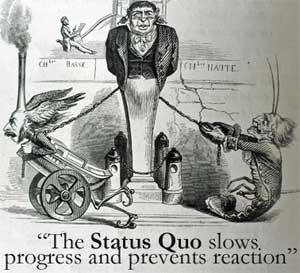Latin is the base of the English language, and many of the words used in religion, grammar, and law are Latin. Read the information that follows about Latin’s influence on the English language. (To learn more, click the link and scroll to page five of the attached PDF):
- Latin has been the most important source for the vocabulary of English.
- As much as 17% of our active word stock is Latin.
- The first Latin loans came to English during contact between the Romans and the Germanic tribes through the adoption of Christianity and the translation of religious and literary texts from Latin into Old English.
- During the Renaissance, Latin was an active second language for many educated people.
- Even in modern times, Latin has remained one of the most common sources of borrowing.
- The borrowing of Latin words and phrases directly into English has traditionally depended on specific contexts—legal, religious, scientific—and as that exposure diminishes, so does the rate of borrowing.
Now that you have some background knowledge about how Latin was introduced into the English language, let’s learn six words or phrases. Draw on any prior knowledge you may have from reading, movies, music, or just life in general as you read each word or phrase. Pronunciation links are provided so that you can hear each word and try to say it out loud. The picture is meant to be a visual representation of the word or phrase, but keep in mind that it’s just one possible representation. You are encouraged to find or draw your own picture to help you understand the meaning of these foreign words or phrases.

quid pro quo
noun
Language: Latin (“what for what”)
Merriam-Webster Dictionary pronunciation:
\,kwid-,prō-'kwō\
How it’s used: It means something given or received for something else—trading goods and services. Often, this phrase is a legal term to describe something traded for something else.
History: This term has been used in English legal documents since at least 1565; the “quid” is slang for “one pound”—a unit of British currency. About the year 1600, quid pro quo entered the language as a way to suggest payment.
Example: The quid pro quo is that I will take care of their dog next weekend if they mow my lawn before they leave.

Source: Cartoon Mona Lisa by Mike R. Baker, Graffiti mona Lisa by
nozoomii, emoticon Mona Lisa by Byron Manley, Flickr.
bona fide
adjective
Language: Latin (from “bona fides” or “good faith”)
Merriam-Webster Dictionary pronunciation:
/'bō-nə-, fīd/
How it’s used: It indicates sincerity, honest intention, or that something actually is what is represented.
History: “Legalese,” the sometimes confusing technical language used by lawyers and in courts, has adopted many Latin terms. Bona fide entered English in British Parliament in 1542 and occasionally has been used to describe documents and papers someone might use to establish credentials such as recommendation letters, diplomas, birth certificates, and other important documents.
Example: Jill took the pearl necklace to the jeweler to make sure it was bona fide before selling it to Fred.

Source: “Carpe Diem,” Jeff Meyer, Flickr
carpe diem
noun
Language: Latin (“seize the day”)
Merriam-Webster Dictionary pronunciation:
/,kärp 'dē,em/
How it’s used: If you know someone who’s afraid to try anything exciting, you might use this Latin phrase to remind them that they only live once, and they should enjoy today without worrying about tomorrow.
History: This word was first used in a poem by the ancient Roman poet Horace, and became a widespread idea in later poetry. The poem, ”Odes 1.11,” written around 20 BCE, ends: “While we’re talking, grudging time will already have fled: seize the day, trusting as little as possible in tomorrow.”
Example: After years of being afraid to bungee jump, Susan yelled “carpe diem!” at the top of her lungs and plunged herself toward the gorge.

Source: Source: 254 Legislature by J.J Grandville, Carl Guderian, Flickr
status quo
noun
Language: Latin (“the state in which,” originally from a longer diplomatic phrase, “the state in which things were before the war”)
Merriam-Webster Dictionary pronunciation:
/'stātəs 'kwō, 'statəs 'kwō/
How it’s used: This phrase is used to mean “The way things have always been.” To maintain the status quo means to keep things as they are and to avoid change.
History: This word came from the language of fourteenth-century diplomacy, in stat quo res erant ante bellum, meaning “in the state in which things were before the war”—that is, enemies, combatants, and leadership should return to the way things were before a war.
Example: Nothing ever seems to change because it’s easier to maintain the status quo than to work to make a difference.

per capita
adverb or adjective
Language: Latin (“by head”)
Merriam-Webster Dictionary pronunciation:
\pər- 'ka-pə-tə\
How it’s used: This term is usually found in statistics in place of “per person.” It suggests that something is equally applied to each individual.
History: Part of the variety of Latin legal phrases, per capita entered the English language in the late 1600s.
Example: Switzerland has the highest per capita rate of chocolate consumption worldwide (22.7 lbs. per person a year).

Source: “Carbon per Capita,” internationalrivers.org
Habeas Corpus
noun
Language: Latin (“you shall have the body”)
Merriam-Webster Dictionary pronunciation:
\'hā-bē-əs- 'kò r-pəs\
How it’s used: Habeas corpus is a legal principle that protects someone from illegal imprisonment. A prisoner can request a writ of habeas corpus to appear before a judge to determine whether his or her imprisonment is legal or not.
History: This term stems from the Latin phrase habeas corpus ad subjiciendum (“You shall have the body to be subjected to examination”) meaning, a person should not be subject to a trial without a defense. Arguably the most famous use of the term is in the Magna Carta, an English charter written in 1215, which challenged the authority of the King of England and later heavily influenced our Constitution’s Bill of Rights.
Example: Amnesty International protested the mass arrests, saying that imprisonment without a reasonable trial was a violation of habeas corpus.
Here’s an excerpt from a New York Times article titled “‘China Threat’ or a ‘Peaceful Rise of China’?” by Ming Xia. In the article you will see the word status quo being used in the reference to the politics of China. As this example shows, foreign words or phrases may often appear in your reading.
During the 1997 Asian financial crises, that China refrained from devaluing its currency and helped stabilize the regional economy by mobilizing its foreign currency reserve won positive reactions from this region and the U.S. . . . The Chinese side basically has sent to Washington a clear message that China is a conservative power and has no intention to upset the status quo—namely the U.S. as the sole superpower in the world. . . . As China has successfully managed relationships with the sole superpower, the second-tier strategic partners, and neighboring countries, China is able to . . . ignore Japan and occasionally show some toughness.
Remember, when you come across a foreign word that you don’t know, look it up in a dictionary. The more you read, the greater your fluency will be. If for some reason, you don’t have access to a dictionary, you can use context clues to help you find the meaning. Look at the passage you just read. After the phrase status quo, a hyphen and the word “namely” appear. The author is helping you figure out what the phrase means. By reading the rest of the sentence, you will understand that status quo refers to having the United States remain the sole superpower in the world. Many times, writers will provide clues to help you figure out the meaning of foreign words.